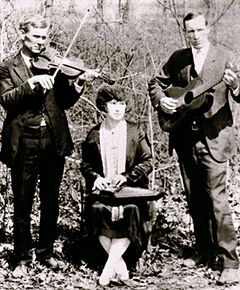Annotation:Ida Red
X:0 T:Ida Red N:From the playing of fiddler James Cowan Powers (1877-1953, N:Scott County, southwestern Virginia), recorded with his family band N:in New York, August, 1924. The band consisted of Powers and his N:children, Charles, Orpha, Carrie and Ada. M:C| L:1/8 R:Reel N:AEae tuning (fiddle) D:Edison 51662-L (78 RPM), Fiddlin' Powers and Family (1924) D:https://www.youtube.com/watch?v=gua7dZ1p68k D:https://www.slippery-hill.com/content/ida-red-4 Z:Transcribed by Andrew Kuntz K:A V:1 clef=treble name="0." [V:1] AB|c2c2 B2cB| ABAA F3F |A2AA BAFF|E-AAA A2AB| c2cc B2BB|ABAA F3F|A2 AA BAFF|EE A2 A2|| A2|[ce]-[ee]-[ee][ee] [e3e3]e|c2c2 A2AA|B2 AB cBAA|F2A2A2(AB| c)c[e2e2] [e4e4]|Jc4 A2AA|BBAB cBAA|F2A2A2||
IDA RED. AKA – "Idy Red." American, Reel (2/4 or cut time). USA; West Virginia, southwest Virginia, east Tennessee, Kentucky, north Georgia, Alabama, Arkansas, Oklahoma, Missouri, Texas. A Major (Kuntz, Milliner/Koken, Phillips): G Major (Krassen, Milliner/Koken, Titon). AEae or Standard tuning (fiddle). AB: AABB (Krassen). "Ida Red" is a melody widespread throughout the South and Mid-West, in both purely instrumental versions and versions with words. The character 'Ida Red' is the subject of a somber song in Alan Lomax's collection American Ballads and Folk Songs, in a section of 'Negro Bad Men', collected from an informant at a Texas prison farm. However, it has no relation to the Ida Red of the various fiddle tune couplets whose gender is feminine or androgynous and often disparagingly comic. Jeff Titon (2001) believes the lyrics suggest an African-American or minstrel origin, but no direct antecedents have surfaced to date.
The tune, which varies widely in its melodic content although retains distinctive cadences, was recorded for the Library of Congress by musicologist/folklorist Vance Randolph from Ozarks Mountains fiddlers in the early 1940's. Riley Pucket's (north Georgia) version of the tune, released in 1926, became the second best-selling country music record for the year. Kentucky fiddler Jim Bowles plays a cross-tuned version. Titon records that the tune was included in the 1915 Berea College students' tune lists, but was not played in any of the Berea, Kentucky, fiddle contests of the era.

Down the road, down the road;
Can't get a letter from down the road.
Down the road, across the creek,
Can't get a letter but once a week.
Ida Red and Ida Blue,
I got stuck on Ida too.
Other couplets, sometimes 'floating verses', were sung in other versions:
Ida Red who lives uptown,
Weighs three hundred and forty pounds,
Down the road and 'cross the creek,
Don't get a letter but once a week.
Refrain
Ida Red, pearly blue,
My little honey don't I love you.
I don't know and I don't care,
know there's hard times everywhere,
Ida Red you won't do right,
won't do nothin' but quarrel and fight.
Down the road hat in my hand,
hello sheriff I've killed my man,
Ida Red you won't do right,
won't do nothin' but quarrel and fight.
Down the road a mile and a half,
my little honey looks back and laughs,
Ida Red you're workin on the road,
work enough money to buy a load.
Ida Red, Ida Blue,
Ida bit a hoecake half in two,
If I'd a-listened to what Ida said,
I'd a-been sleepin' in Ida's bed.
I went down town one day in a lope,
Fool around till I stole a coat;
Then I come back and I do my best,
Fool Around till I got the vest.
O weep! O my Idy!
For over dat road I'm bound to go. . . . {Thede}
"Ida Red" verses floated to other tunes as well. North Carolina banjo player Charlie Poole and his band The North Carolina Ramblers issued their recorded of "Shootin' Creek" in 1928, containing the lines:
Ida Red, she's a darned old fool,
Tried to put a saddle on a hump-back mule.
or the variant:
Ida Red, she ain't a fool,
Bigger'n an elephant, stronger'n a mule.
Georgia fiddler Bill Shores, a native Alabamian who spent most of his life in the Rome, Georgia, area (according to Wayne Daniels), recorded the tune with guitarist Riley Puckett in Atlanta in 1926. Texas fiddler Bob Wills, the 'Father of Western Swing', used the melody for his recording of "Ida Red," but with different lyrics[1]. Later, in 1949, Wills and his band The Texas Playboys issued a boogie-woogie version of "Ida Red" called "Ida Red Likes The Boogie"[2], which made it into Billboard's top ten songs of 1950.
See also the related songs "Over the Road" (Gus Cannon) and two songs from Uncle Dave Macon, "Feather Bed" and "Over the Road I'm Bound To Go". See also the related "Down the Road."

